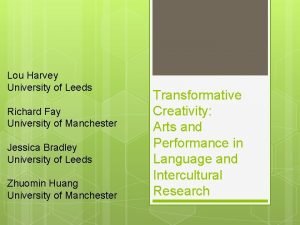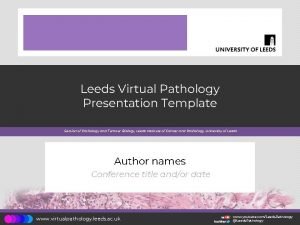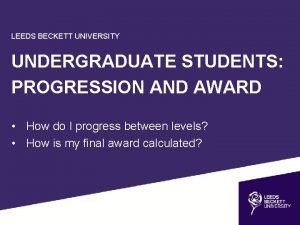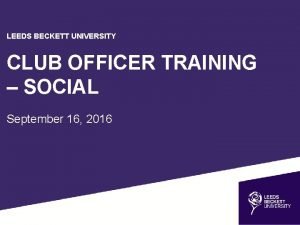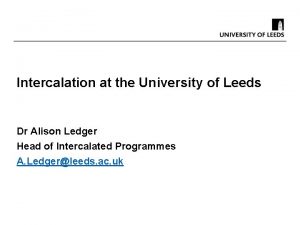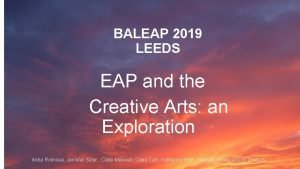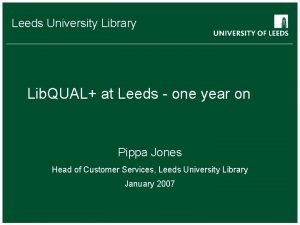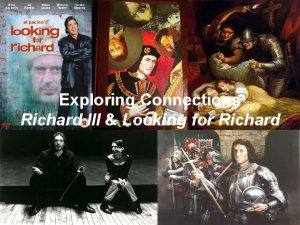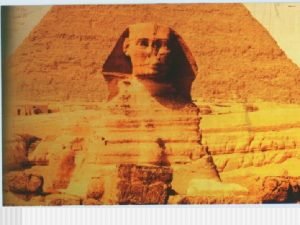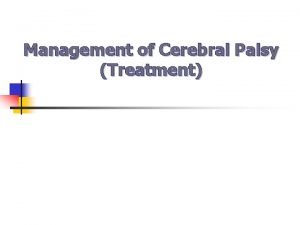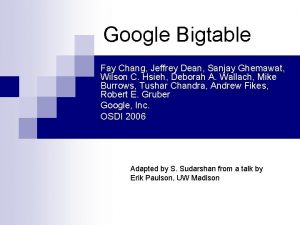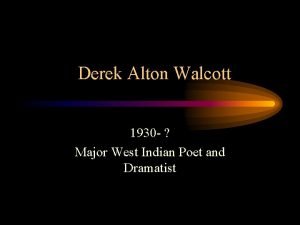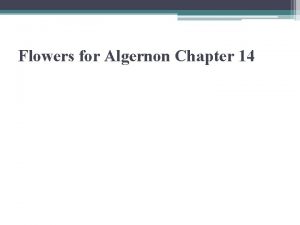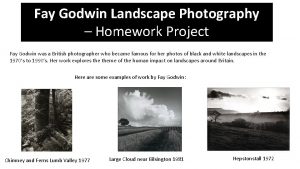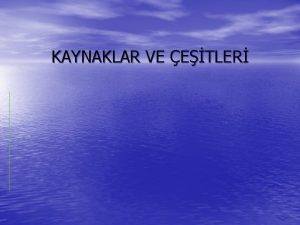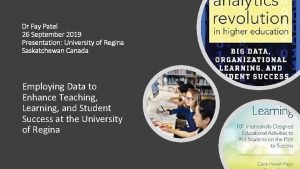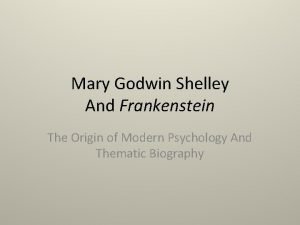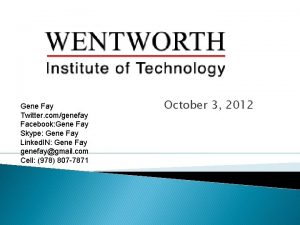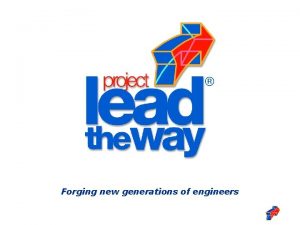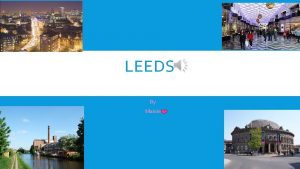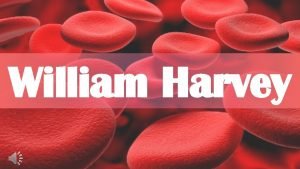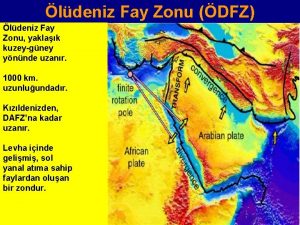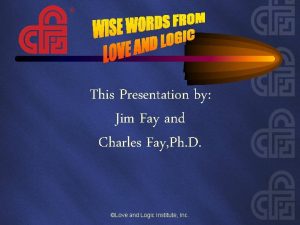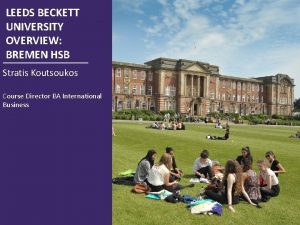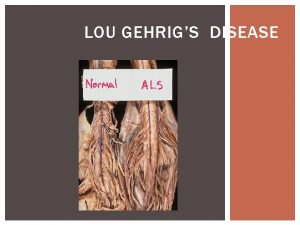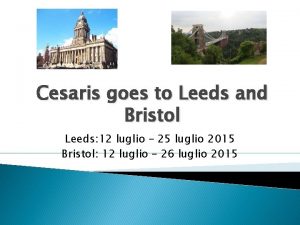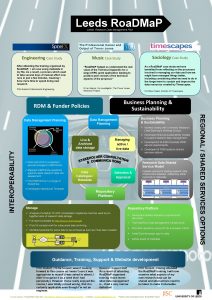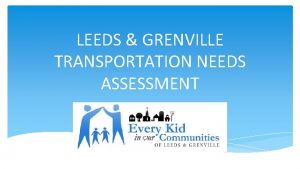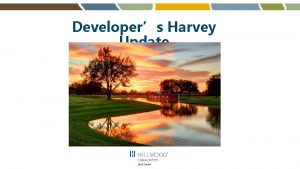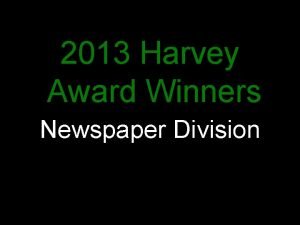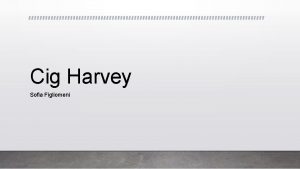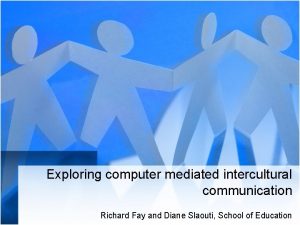Lou Harvey University of Leeds Richard Fay University


















- Slides: 18

Lou Harvey University of Leeds Richard Fay University of Manchester Jessica Bradley University of Leeds Zhuomin Huang University of Manchester Transformative Creativity: Arts and Performance in Language and Intercultural Research

Lou Harvey University of Leeds Collaboration and co -creation in adapting language and intercultural research for performance

Collaboration and co-creation ‘Trans-ing’ (Mylona 2016)

My research Language learning motivation as ideological becoming (Harvey 2014; Bakhtin 1981) Bakhtin and the polyphonic novel (1984): the author creates ‘freedom for others’ points of view to reveal themselves’ while maintaining a ‘positive and active quality’ (67) Dialogic interview methodology: talking with rather than talking to the participants (Harvey 2014, 2015)

Why adapt for performance? Findings: communicative struggles in UK despite high English proficiency – destabilising Migration, ‘integration’, English: awareness of immigrants’ (language) experience collective responsibility for accommodation and hospitality Ethics – what happens to research stories? How to communicate research to the public?

Leeds Creative Lab: Working with Cap-a-Pie

the assumption that you know what’s going on around you, but then you realise that actually you don’t know the rules Brad: ‘Making the mechanics visible’

Creative inquiry Stimulus: Short verbatim text from research Brainstorming themes Responding creatively to themes: idea for a restaurant and a business Philosophical question based on two themes: ‘What ambitions are acceptable? ’ Creating characters, stories, scenes, dialogues

‘What ambitions are acceptable? ’

Making the mechanics visible in Up and up towards… Began with Shifted to Story narrated by actor, with actions to denote the characters Actor stepping out of role to comment on the story or on his performance (e. g. changing some of the actions) Some sections spoken in gibberish Story narrated in English Story follows a recognisable narrative development pattern Story change without warning at climactic point: Icarus was flying up and up towards the pub that Andy and Liesl went to on a Friday. . . - Shift again as Liesl flies to London, up and up towards end of Icarus story Audience sitting facing/watching Audience asked to recreate a pub and the performer individuals asked to play Liesl

Audience responses What the performance was about Responses to it Non-verbal communication Interweaving stories Languages Silences Interruptions Fantasy Not understanding Communications Filling in the gaps Storytelling Setting up & breaking convention Semiotics Making sense Multifaceted Withdrawal Uncomfortable (x 2) Unpredictable Anticlimax Disruption Incongruous Immersive Engaging Humorous Delightful Constructive Neutral Absurd Celebratory of narrative Suspenseful Spontaneous

‘Trans-ing’ in Up and up towards Performativity, ‘trans-’ (Jones 2016), ‘trans-ing’ (Mylona 2016) Andersen (2016) on performativity and trans-: anti- essentialist, poysemous, processual, relational When trans- is understood as process, it highlights ‘our relationship to knowledge creation as performative … the trans- is itself fluid and multipurpose, a mode of performing complex relationships between one site, identification or mode of speaking/doing/being and another’ (Jones 2016: 4, 2)

‘Trans-ing’ in Up and up towards Performance created on multiple planes, through a process of ‘interthinking’ (Littleton and Mercer 2013) Knowledge transcreation (Huang and Fay 2016): ‘a multi-directional and inter-transformative process of merging, encompassing and (re)creation. . . an intertransformative (e. g. trans-lingual, trans-cultural, transdisciplinary, trans-practitionality, trans-methodological and trans-conceptual) space of thinking and interthinking’ (n. p. )

‘Trans-ing’ in Up and up towards ‘ensemble thinking … a mode of transauthorship’ through which ‘our voicing percolates’ (After Performance Working Group 2016: 35, 36). We use the prefix ‘trans-’ not to attempt a transcendence of the figure of the author or of authorship, but to attest to an experience of transmutating beyond the boundaried authorial self, towards moments of transparency, transmission, and the transit – or more definitively the circulatory movements – of ideas’ (APWG 2016: 36).

‘Trans-ing’ in Up and up towards allows for ‘an understanding of a field of knowledge in a momentary and processual way – it … enables rather than confirms or fixes knowledge about the world’ (Jones 2016: 5, citing Gotman 2016) sensing rather than thinking (Mylona 2016)

Conclusion: A different form of knowledging? Is Up and up towards is ‘a new object, that belongs to no-one’ (Barthes 1984: 72) … … or ‘a new object’, that belongs to everyone? Transcreation and transauthorship ‘an ethos of critical care’ (After Performance Working Group 2016: 35)

References After Performance Working Group. (2016). After Performance Research 21 (5), 35 -36. Andersen, T. (2016). An Object that Belongs to No-One. Performance Research 21 (5), 12 -16. Bakhtin, M. M. (1981). The dialogic imagination: Four essays. (M. Holquist, Ed. ; C. Emerson & M. Holquist, Trans. ). Austin: University of Texas Press. Bakhtin, M. M. (1984). Problems of Dostoevsky’s Poetics. (C. Emerson, Ed. & Trans. ). Minneapolis: University of Minnesota Press. Barthes, R. (1984). The Rustle of Language (R. Howard, trans. ). Berkeley: University of California Press. Gotman, K. (2016). Translatio. Performance Research 21 (5), 17 -20. Harvey, L. (2014). Language learning motivation as ideological becoming: Dialogues with six English-language learners (Unpublished doctoral dissertation). University of Manchester, UK. Harvey, L. (2015). Beyond member-checking: a dialogic approach to the research interview. International Journal of Research and Method in Education, 38 (1), 23 -38. Huang, Z. & Fay, R. (2016). Knowledge Transcreation. Unpublished working article. Jones, A. (2016). Introduction. Performance Research 21 (5), 1 -11. Littleton, K. & Mercer, N. (2013). Interthinking: Putting Talk to Work. Abingdon and New York: Routledge. Mylona, S. (2016). Trans-ing. Performance Research 21 (5), 65 -67. Ricoeur, P. (2006). On translation. Abingdon and New York: Routledge.

Thank you! L. T. Harvey@leeds. ac. uk
 Lou harvey leeds
Lou harvey leeds Leeds pathology slides
Leeds pathology slides Leeds beckett university awards
Leeds beckett university awards Colt materials leeds
Colt materials leeds Intercalation leeds
Intercalation leeds University of leeds padlet
University of leeds padlet Leeds university library
Leeds university library Looking for richard analysis
Looking for richard analysis Fay chertkoff
Fay chertkoff Temple fay technique
Temple fay technique Fay chang google
Fay chang google Derek alton walcott
Derek alton walcott Fay lillman
Fay lillman Fay godwin photography analysis
Fay godwin photography analysis Geçirimli kayaç fay hattı
Geçirimli kayaç fay hattı Fay patel
Fay patel Fay godwin biography
Fay godwin biography Gene fay
Gene fay Fbd
Fbd
